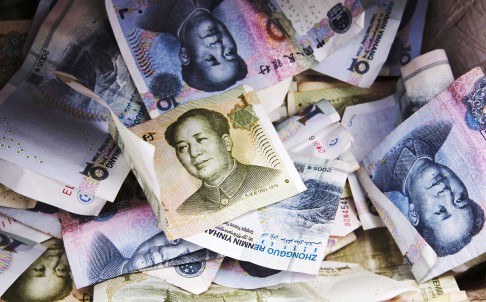US$1.25 trillion moved out of mainland China illegally in 10 years, says report
PUBLISHED : Tuesday, 16 December, 2014, 8:44am
UPDATED : Tuesday, 16 December, 2014, 11:37am
Benjamin Robertson
[email protected]

The equivalent of US$249.5 billion was moved out of the mainland illicitly in 2012, the report says, up 53 per cent year on year. Photo: Reuters
The mainland lost US$1.25 trillion between 2003 and 2012 to illicit outflows including tax evasion, crime and corruption, the largest loss of money among 151 developing nations surveyed, according to a Washington-based advocacy group that tracks such activities.
This number was described as “highly conservative” as it did not include cash settlements, common among drug dealers and money launderers, Global Financial Integrity said in an annual report on illicit financial flows.
“After a brief slowdown during the financial crisis, illicit outflows are once again on the rise, hitting a new peak of US$991.2 billion in 2012”, 10 times the amount those countries received in official development aid, report authors Dev Kar and Joseph Spanjers wrote.
The growth in unlicensed outflows outstripped the rise in global gross domestic product and should give policymakers pause for thought. Illicit outflows represent a circumvention of national taxation policies, meaning a net loss to local treasuries, and a knock-on disruption to balance of payments and fiscal policies; especially in economies like the mainland’s, which have strict capital control measures in place to restrict money going offshore.
The mainland had the biggest outflow in 2012 of US$249.5 billion, up 53 per cent on 2011, the report said, citing data from the World Bank and International Monetary Fund.
The second-largest cumulative outflow was in Russia, which lost an estimated US$973.8 billion between 2003 and 2012. Mexico and India were third and fourth, losing US$514.2 billion and US$439.5 billion respectively.
As a continent, Asia accounted for 40.3 per cent of unauthorised financial flows from the developing world during the period.
That the mainland should lead the league table is not surprising given its population and economic size. Mainland capital controls also mean that some companies have to resort to illegitimate ways to move money offshore as a cost of doing business.
“Not all illegal money movement is money laundering,” said risk consultant Julian Russell.
Capital control rules “encourage an underground economy for people providing a facilitation service to move money”, Russell said.
Most illicit outflows were due to trade mis-invoicing, described by the report as “an acute problem for administrations in developing countries”, whereby traders under-invoice exports and over-invoice imports as a way to move money offshore.
Such practices have long been common on the mainland, and discrepancies between mainland and Hong Kong trade data have often been cited by analysts as evidence of widespread tax evasion and money laundering.
In some cases however, money is round-tripped back into the economy as foreign investment.
To curtail furtive financial flows, the report recommended governments create registers of corporate beneficial owners, tighten anti-money-laundering rules, and force multinationals to disclose profit and loss, sales, and taxes paid, broken down by national market.
